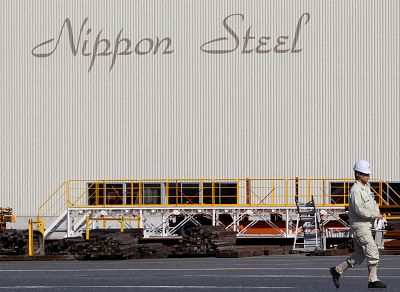Japan denounced the verdict as "unthinkable," while expressing hope cooperation over North Korea would not be jeopardized.
South Korea's top court ruled Tuesday that a Japanese steel producer must compensate South Koreans for their forced labor during World War II.
Japan denounced the verdict against Nippon Steel & Sumitomo Metal Corp. as "unthinkable," while expressing hope that cooperation over North Korea would not be jeopardized.
The landmark ruling saw South Korea's Supreme Court uphold a 2013 order for the company to pay 100 million won ($87,700) to each of the four steel workers who initiated the suit in 2005.
Lee Choon-shik, 94, is the sole surviving plaintiff. He welcomed the ruling, but told a televised news conference that it was "heartbreaking to see it today, left alone alive."
The two countries share a bitter history, including Japan's 1910-45 colonization of the Korean peninsula and the use of"comfort women," Japan's euphemism for girls and women, many of them Korean, forced to work in its wartime brothels.
"This verdict is a decision that is impossible in light of international law."
The ruling prompted a swift and angry reaction from Tokyo.
Japanese Prime Minister Shinzo Abe told parliament the matter had been "completely and finally" settled by a 1965 treaty normalizing relations between his country and South Korea, something rejected by the court. "This verdict is a decision that is impossible in light of international law," Abe said.
Foreign Minister Taro Kono summoned South Korean ambassador Lee Su-hoon. However he also told reporters he hoped Seoul would do what was needed to prevent the matter from affecting cooperation between the two U.S. Asian allies trying to rein in North Korea's nuclear program.
Japanese Deputy Chief Cabinet Secretary Kotaro Nogami told a news conference that if Seoul did not respond promptly, Tokyo would consider its options, including international arbitration.
Nippon Steel said it would review the "deeply regrettable" verdict before taking any steps. The company merged with Sumitomo Metal Industries in 2012. It had argued it was not responsible for the actions of the wartime steelmaker.
Some Seoul officials and experts fear the court's decision, final and binding, could damage bilateral relations.
If Nippon Steel refuses to compensate, the plaintiffs could request a seizure of the company's property in South Korea, which may result in an exit of some Japanese businesses, a cut in investment and a flare-up in anti-Japanese sentiment.
South Korea's foreign ministry, under a previous government, said that a seizure of assets could drive relations into an "irreversible catastrophe."
"We might have to brace for not only a diplomatic crisis but a pull-out of some Japanese firms and a fall in new investment," said Shin Beom-chul, a senior fellow at Asan Institute for Policy Studies in Seoul.
Other former laborers and survivors of wartime atrocities, including the comfort women and two atomic bombings in Japan, could also follow suit, activists and analysts said.












